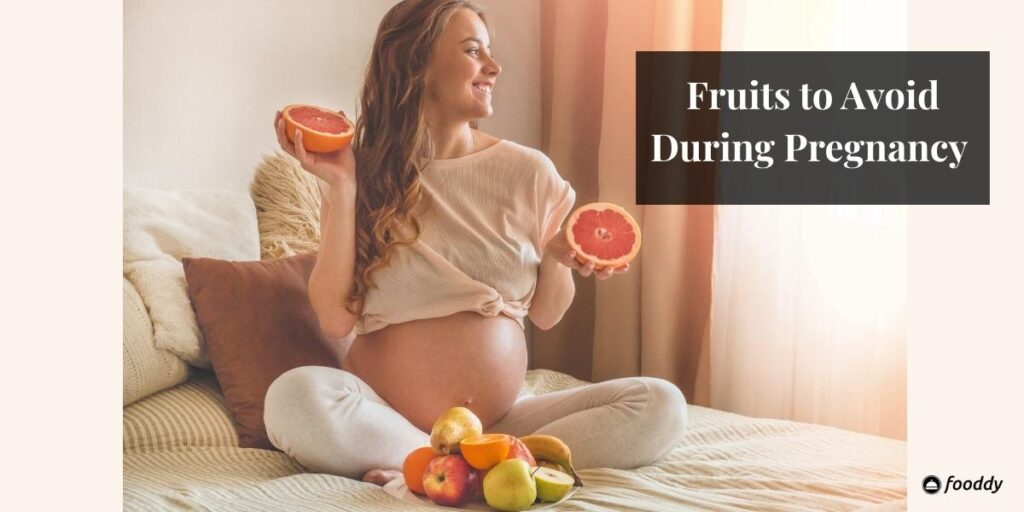Pregnancy is often described as one of the most beautiful and transformative phases in a woman’s life, but it also brings with it significant changes-not only in the body but also in everyday lifestyle choices, particularly when it comes to diet. Expecting mothers are usually encouraged to follow a wholesome, nutrient-dense eating plan that includes a wide variety of fresh fruits and vegetables to support both maternal health and the baby’s growth. While fruits are generally considered a powerhouse of essential vitamins, antioxidants, and dietary fiber, it’s important to note that not every fruit is completely safe for consumption during pregnancy. In this blog, we’ll take a closer look at the Fruits to Avoid During Pregnancy . We’ll also discuss trimester-specific concerns so that you can make mindful and informed dietary decisions throughout all stages of this incredible journey.
Certain fruits, especially when consumed unripe or in excessive amounts, may lead to complications such as premature contractions, digestive discomfort, or even hinder proper fetal development. This makes it crucial for pregnant women to have a clear idea of not only which fruits should be limited or avoided but also at which stage of pregnancy the risks are greater. Being aware of these precautions can help ensure safer eating habits and peace of mind.
Top 10 Fruits to Avoid During Pregnancy
When it comes to maintaining a healthy pregnancy, knowing which foods to enjoy and which to approach with caution is crucial. Certain fruits, despite their popularity and nutritional value, are often singled out by healthcare professionals because of specific risks they may pose to expecting mothers and their developing babies. These concerns can vary; while some fruits might need to be completely eliminated from the diet, others may just require mindful, moderate consumption-especially if there are particular health conditions or if women are in specific stages of their pregnancy. Factors such as allergies, digestive sensitivities, or the risk of triggering unwanted symptoms can influence these recommendations.
In this section, we’ll highlight the ten fruits most frequently flagged by experts as potential risk factors during pregnancy. Understanding why these fruits are considered problematic and learning about trimester-specific issues will empower expecting mothers to better safeguard their health and that of their little one, making every dietary choice with confidence and care.
Papaya (especially unripe or semi-ripe)
- Contains latex, which can trigger uterine contractions
- Unripe papaya enzymes may lead to miscarriage in early pregnancy
In its unripe or semi-ripe form, papaya contains higher levels of latex-a compound known to stimulate uterine contractions, making it especially risky during pregnancy’s early months. The active enzymes present in unripe papaya can disrupt the normal hormonal balance, increasing chances of miscarriage or premature labor. While some cultures believe ripe papaya in moderation is safe, experts strongly recommend that pregnant women avoid unripe or partially ripe papaya entirely to safeguard their health and prevent unwanted complications.
Related – Fruits to Eat During Pregnancy
Pineapple (in excess)
- Contains bromelain, which may soften the cervix and trigger early labor
- Should be avoided especially in the first trimester
Pineapple is popular for its sweetness and vitamin C, but the enzyme bromelain found in this fruit can potentially soften the cervix, sometimes leading to early labor or contractions if consumed in large quantities. The risk is greatest during the first trimester, when the body is most vulnerable to such changes. Occasional small portions are generally safe, but regular consumption or large servings should be approached with caution to avoid unnecessary complications in the early stages of pregnancy.
Grapes (especially black grapes)
- Resveratrol in grape skin can be toxic in large amounts
- Difficult to digest and can cause gas or heat buildup
Black grapes, in particular, contain resveratrol-a powerful antioxidant, but it can be toxic when ingested in large amounts, especially for pregnant women. Additionally, grapes are sometimes challenging to digest, often causing gastrointestinal discomfort like gas or warmth in the body. These effects can be more pronounced depending on individual health conditions, so minimizing their intake can help promote smoother digestion and lessen any risk of toxicity during pregnancy.
Tamarind
- High in vitamin C, which in excess may suppress progesterone
- Can increase risk of early contractions
Rich in vitamin C and commonly used in Indian cooking, tamarind can reduce progesterone levels when consumed excessively. Since progesterone is essential for maintaining a healthy pregnancy, any drop can increase the likelihood of early uterine contractions and even preterm labor. The sour-sweet flavor may be tempting, but it’s best to limit tamarind, especially in recipes, and always check with a healthcare provider if uncertain about appropriate amounts.
Frozen or canned fruits
- Often contain added sugar, preservatives, or listeria risk
- Always opt for fresh, washed fruit instead
Frozen and canned fruits may seem convenient, yet they often come loaded with added sugars and preservatives that are not ideal for pregnant women. There’s also a heightened risk of bacterial contamination, like listeria, which can be harmful to both mother and baby. Choosing fresh, thoroughly washed fruits is always the safer, healthier route. This simple swap helps prevent exposure to unwanted chemicals while ensuring the best possible nutrition.
Dates (in excess)
- Heat-inducing fruit that may stimulate uterine muscles
- Can cause contractions if consumed too frequently in early pregnancy
Dates are nutritious and naturally sweet, but consuming them in large quantities, especially in the early stages of pregnancy, may heat the body and stimulate uterine muscles. This increased internal heat has the potential to cause contractions, posing a risk if dates are eaten too frequently. While moderate intake is typically harmless later on, it’s best to hold off on regular consumption in the first trimester and consult health professionals about portion sizes.
Lychee
- High sugar content
- May cause gestational diabetes or blood sugar spikes
Lychee is delicious but high in sugar, which can quickly affect blood glucose levels for pregnant women. Frequent or large servings may raise the risk of gestational diabetes or cause sharp sugar spikes, especially in those already predisposed to diabetes. For safe pregnancy nutrition, enjoy lychee only occasionally, and monitor overall fruit sugar intake as advised by a dietitian or doctor.
Star Fruit (Carambola)
- Can be neurotoxic if consumed by individuals with kidney issues
- Best avoided during pregnancy unless approved by a doctor
Star fruit, while unique and refreshing, has compounds that can be neurotoxic for people with renal impairment. Pregnant women, whose kidneys are often more taxed, should steer clear of star fruit unless a doctor explicitly approves it. This precaution helps minimize unknown risks and protects against adverse reactions that could impact both maternal health and fetal development.
Jackfruit
- Can produce excess gas and bloating
- Avoid in large quantities or during digestion issues
Jackfruit is popular for its texture and versatility. However, it can generate excessive gas and bloating, especially in women prone to digestive issues during pregnancy. Since some expecting mothers experience increased sensitivity, limiting jackfruit intake and opting for easier-to-digest fruits can help prevent discomfort and maintain better gut health during this crucial period.
Wild berries or unknown foraged fruits
- May contain toxins or allergens
- Stick to safe, commercially available berries
Foraged or wild berries may appear enticing, but they can contain hidden toxins or allergens that aren’t always apparent. Pregnant women are advised to avoid these unknown varieties, sticking only to commercially available, quality-tested berries. This minimizes the risk of allergic reactions and ensures safer fruit choices throughout pregnancy.
Note: Eating these fruits occasionally and in small portions may be safe for some women, but always consult your gynecologist or dietitian for personalized advice.
Fruits to Avoid During Pregnancy – First Trimester
The first trimester is an extremely delicate period in pregnancy because this is when the baby’s vital organs start forming, making the developing fetus highly susceptible to any disruptions. At this stage, it is crucial to steer clear of fruits that might stimulate uterine contractions or cause hormonal imbalances that could increase the risk of miscarriage. Paying close attention to dietary choices can help provide a safer environment for the growing baby.
Fruits to avoid in the first trimester:
- Unripe Papaya – Contains latex that can cause uterine contractions
- Pineapple – Bromelain may induce softening of the cervix
- Dates – Can increase internal heat and uterine activity
- Tamarind – May reduce progesterone levels if consumed excessively
First trimester tip: Focus on eating hydrating and fiber-rich fruits like bananas, apples, and oranges. These fruits help maintain good digestion and hydration without causing heat or acidity, which are common concerns during early pregnancy. Avoiding fruits that may trigger uterine activity or hormonal shifts is key to promoting a healthy first trimester.
Fruits to Avoid During Pregnancy – Second Trimester
The second trimester is typically a more stable and comfortable phase for many pregnant women, but it still requires mindful eating habits. This period often brings challenges such as gestational diabetes, acidity, and digestive problems, so careful attention to fruit choices is important. Certain fruits that are high in natural sugars or those that cause digestive discomfort should be limited to maintain overall health and prevent complications.
Fruits to avoid in the second trimester
- Lychee – High natural sugar may increase risk of gestational diabetes
- Grapes (especially in large amounts) – Can cause gas and heat
- Jackfruit – May worsen bloating or constipation
- Canned fruits – Often contain preservatives and added sugars
Second trimester tip: Reduce intake of sugar-dense fruits and focus on eating balanced, seasonal fruits in moderate portions. These fruits help improve digestion, keep the body hydrated, and contribute vital nutrients, supporting both maternal well-being and fetal development during this crucial stage.
Fruits to Avoid During Pregnancy – Third Trimester
During the final trimester, your body undergoes significant changes as it prepares for labor and delivery. At this stage, it becomes especially important to avoid fruits that could potentially stimulate uterine contractions prematurely or cause discomfort through bloating and digestive issues. Being cautious about fruit choices can help promote a smoother, safer end to your pregnancy journey.
Fruits to avoid in the third trimester
- Pineapple (in excess) – May stimulate labor before full term
- Papaya (if unripe) – Even later in pregnancy, it’s not recommended
- Excess Dates – May lead to early contractions if not medically advised
- Star Fruit – Can be harmful for women with kidney concerns
- Overripe or fermented fruits – Can upset digestion and increase risk of foodborne illness
Third trimester tip: Opt for fruits known to reduce swelling and improve hydration, such as watermelon, kiwi, and apples. Additionally, always make sure to wash fruits thoroughly to minimize the risk of infections, which can be particularly dangerous during this vulnerable stage.
Conclusion
Fruits are undoubtedly a key part of a nourishing pregnancy diet, offering important nutrients like vitamins, minerals, and fiber. But it’s just as important to know which fruits to avoid to keep both mom and baby safe. Some fruits might cause uterine contractions, upset digestion, or increase body heat, which could potentially create complications if not consumed carefully.
To summarize:
- Steer clear of unripe papaya, too much pineapple, large amounts of grapes, and sweet fruits like lychee or tamarind.
- Make it a habit to pick fresh, ripe, and seasonal fruits whenever possible.
- Try to avoid canned, preserved, or unwashed fruits, since these can carry additives or bacteria that aren’t safe during pregnancy.
Remember, every pregnancy is unique. What’s fine for one woman might not suit another, so always check with your doctor or nutritionist before making any big changes to your diet-especially if you have allergies, digestion problems, or a high-risk pregnancy.
FAQs
Q1. Is it safe to eat pineapple during pregnancy?
Ans:- Small amounts of pineapple may be safe to consume during the second and third trimesters. However, eating large quantities-particularly in the first trimester-can soften the cervix and potentially trigger contractions. It’s always best to check with your doctor before including pineapple regularly in your diet during pregnancy.
Q2. Why is papaya dangerous during pregnancy?
Ans:- Unripe or semi-ripe papaya contains latex, a compound that can cause uterine contractions. This increases the risk of miscarriage, especially in the early stages of pregnancy. Ripe papaya is generally safer, but it’s still wise to consult your healthcare provider.
Q3. Can I eat grapes while pregnant?
Ans:- Grapes can be enjoyed in moderation. Black grapes or consuming them in large amounts, however, may lead to heat buildup and indigestion. Pregnant women prone to constipation or acidity should especially avoid grapes during the third trimester.
Q4. Are dates good or bad during pregnancy?
Ans:- Dates provide good nutrition but are considered heat-inducing. In the third trimester, they may help soften the cervix and prepare the body for labor. During earlier stages, though, dates should be consumed sparingly and only under medical advice.
Q5. Can lychees cause complications during pregnancy?
Ans:- Yes, lychees have a high sugar content, which can contribute to gestational diabetes if eaten excessively. Limiting intake and balancing your fruit choices is important to avoid blood sugar spikes.
Q6. Should I avoid canned fruits during pregnancy?
Ans:- It’s recommended to avoid canned fruits when possible, as they often contain added sugars and preservatives. There is also a small risk of listeria contamination, which is dangerous during pregnancy. Fresh, washed fruits are always the safer choice.
Q7. What if I accidentally ate papaya or pineapple during early pregnancy?
Ans:- Try not to worry too much. A small amount likely won’t cause harm, but it’s best to inform your doctor. Keep an eye out for any symptoms such as cramping or unusual discomfort, and seek medical advice if needed.







